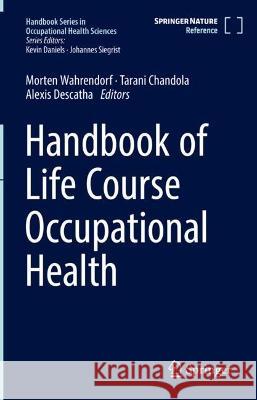Handbook of Life Course Occupational Health » książka



Handbook of Life Course Occupational Health
ISBN-13: 9783031304910 / Angielski
Handbook of Life Course Occupational Health
ISBN-13: 9783031304910 / Angielski
(netto: 1562,36 VAT: 5%)
Najniższa cena z 30 dni: 1465,09
ok. 16-18 dni roboczych.
Darmowa dostawa!
Introduction - Background - Two Pathways Between Occupation and Health - Transformation of Modern Work, Rise of Atypical Employment, and Health - The Impact of New Technologies on the Quality of Work - Methodological challenges - Sequence Analysis and Its Potential for Occupational Health Studies - Job-Exposure Matrices: Design, Validation, and Limitations - Challenges of Large Cohort and Massive Data in Occupational Health - Integration of Occupational Exposure into the Exposome - Methods in Modeling Life Course - Early life impact on work and health - Genetics, Epigenetics, and Mental Health at Work - A Life Course Perspective on Work and Mental Health: The Working Lives of Young Adults - Occupational trajectories and midlife health: Exposure to chronic hazards at work - Chemical Hazards at Work and Occupational Diseases Using Job Exposure Matrices - Biomechanical Hazards at Work and Adverse Health Using Job-Exposure Matrices - Long Working Hours and Health Effects - Health Effects of Shift work and Night Shift Work - Psychosocial Work Environment and Health: Applying Job-Exposure Matrices and Work Organization and Management Practice - Occupational Differences in Work Related Mental Health: A Lifecourse Analysis of Recent Trends in the European Context - Occupational trajectories and midlife health: Exposure to irregular and discontinued hazards at work - Adverse Employment Histories: Conceptual Considerations and Selected Health Effects - Precarious Work and Health - Gig Work and Health - Gender Differences in Work Participation over the Life course and Consequences for Socioeconomic and Health Outcomes - Occupational trajectories in the context of disability - Changing Experiences, Needs, and Supports Across the Life Course for Workers Living with Disabilities - Working Careers with Common Mental Disorders - Adverse Effect of Psychosocial Stressors at Work and Long Working Hours Along the Cardiovascular Continuum - Pathways to Retirement and Health Effects - Interventions and policy implications - Worksite Health-Promotion: Evidence on Effects and Challenges - Falling Sick While Working: An Overview of the EU-Level Policy Framework on Returning to Work Following Chronic Disease(s) - The Role of Social and Labour Policies in Shaping Working Conditions Throughout the Life-Course - Future perspectives - Occupational Trajectories and Health Inequalities in a Global Perspective - Conceptual and Methodological Directions of Occupational Life Course Research, Included After Pandemic Changes
Morten Wahrendorf works at the Institute for Medical Sociology of the University Düsseldorf, Germany, where he leads the working group on “Work & Health”. He has previously worked at the International Centre For Life-course Studies in Society and Health (ICLS) at University College London. His main research areas are work stress, health inequalities, life course epidemiology, ageing, and the comparative analyses of longitudinal cohort studies. He leads several projects that investigates both individual and national predictors of working conditions across the life course and their long-term effects on health at older ages. His research expertise spans different disciplines-including public health, epidemiology, statistics and sociology.
Alexis Descatha is a Professor in Occupational Health in Paris then in Angers (Western of France), at University of Angers/ Inserm Irster/Ester, and lead the Clinical Toxicological Unit - Poison Control Center, in university hospital of Angers. His research focuses on the epidemiology of work disorders, musculoskeletal and other chronic diseases. He has interest on exposure assessment using a job exposure matrix and on performing systematic reviews. As emergency physician, he also conducts research on emergencies in occupational settings and created the ICOH’s scientific committee on Emergency Preparedness and Response, and involved in ICOH as board member in 2022-24. He is the Editor-in-Chief of Les Archives des Maladies Professionnelles et de l’Environnement. Recently, he was appointed Clinical Professor of Occupational Medicine, Epidemiology and Prevention at Hofstra School of Medicine, USA. In 2021, he received the Légion d’Honneur. To promote transfer research to practitioners in occupational health in a Translational Epidemiology Center on Occupational health, Toxicology, and Preparedness, he is presenting a YouTube channel (with University of Angers support). He is working also in promoting research in occupational health for different national and international agencies.
1997-2026 DolnySlask.com Agencja Internetowa
KrainaKsiazek.PL - Księgarnia Internetowa









